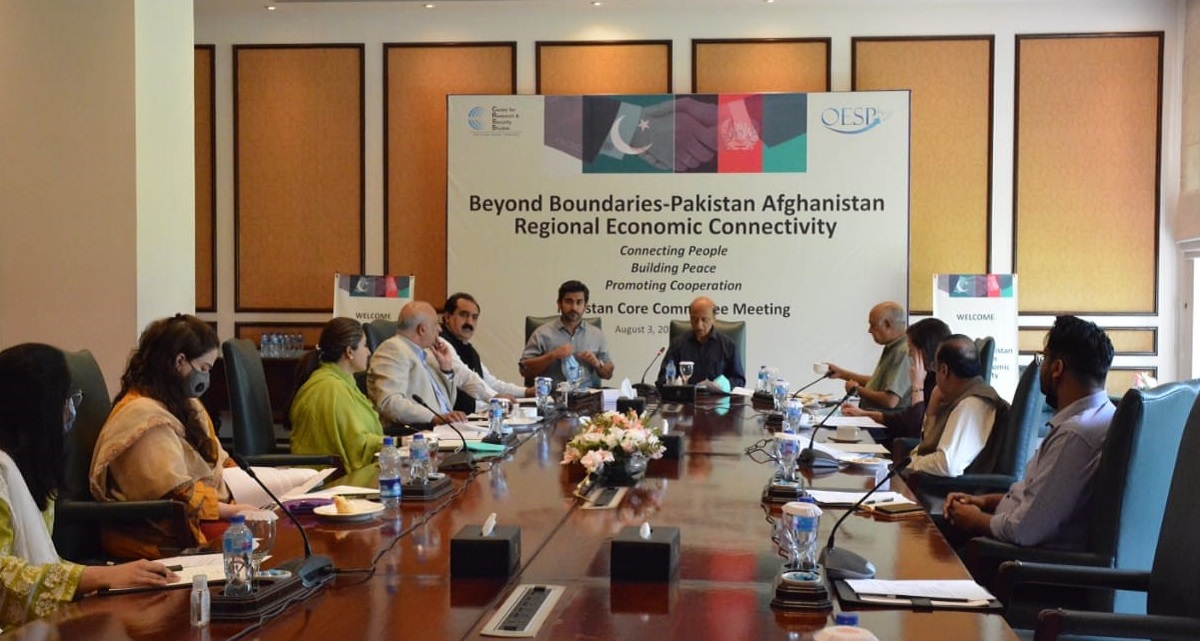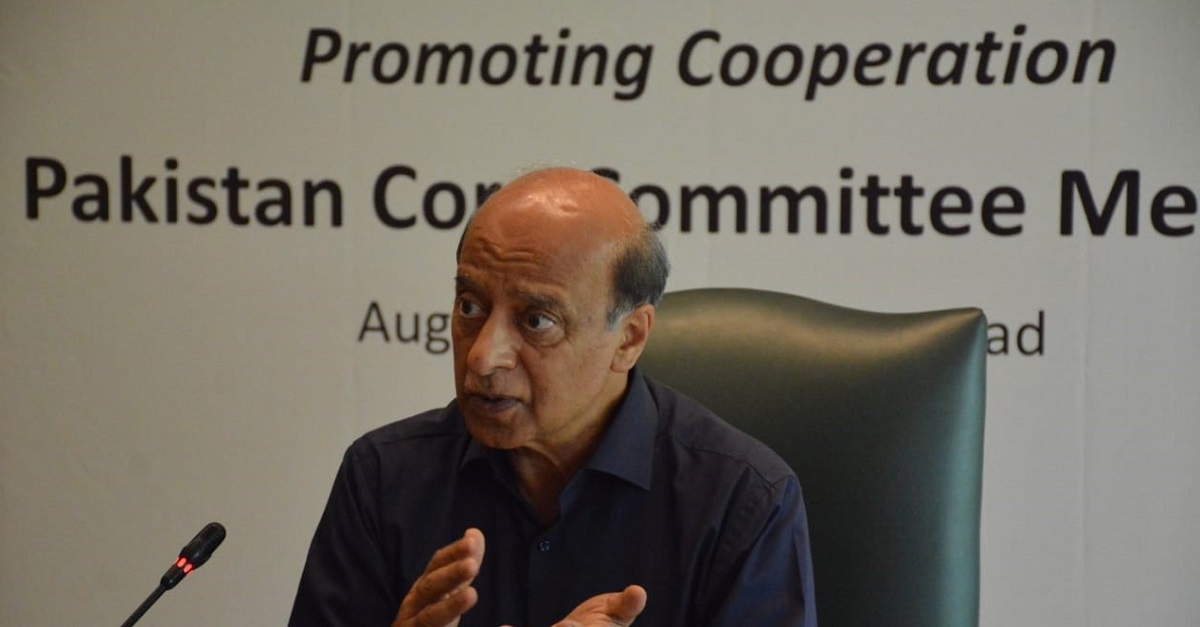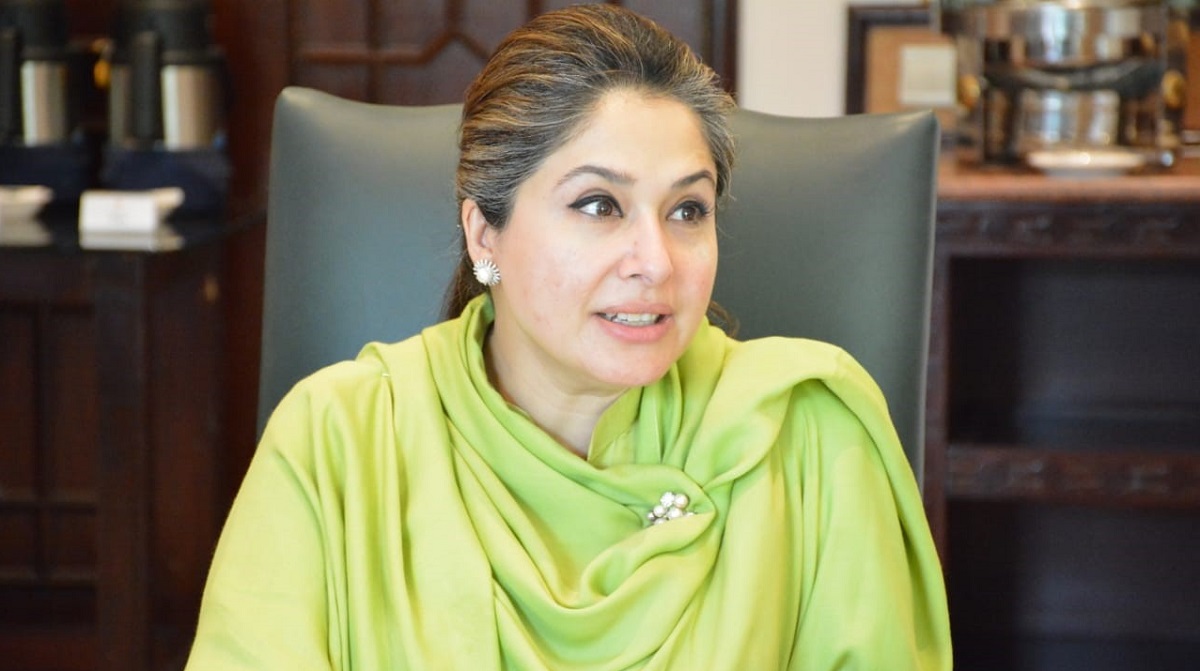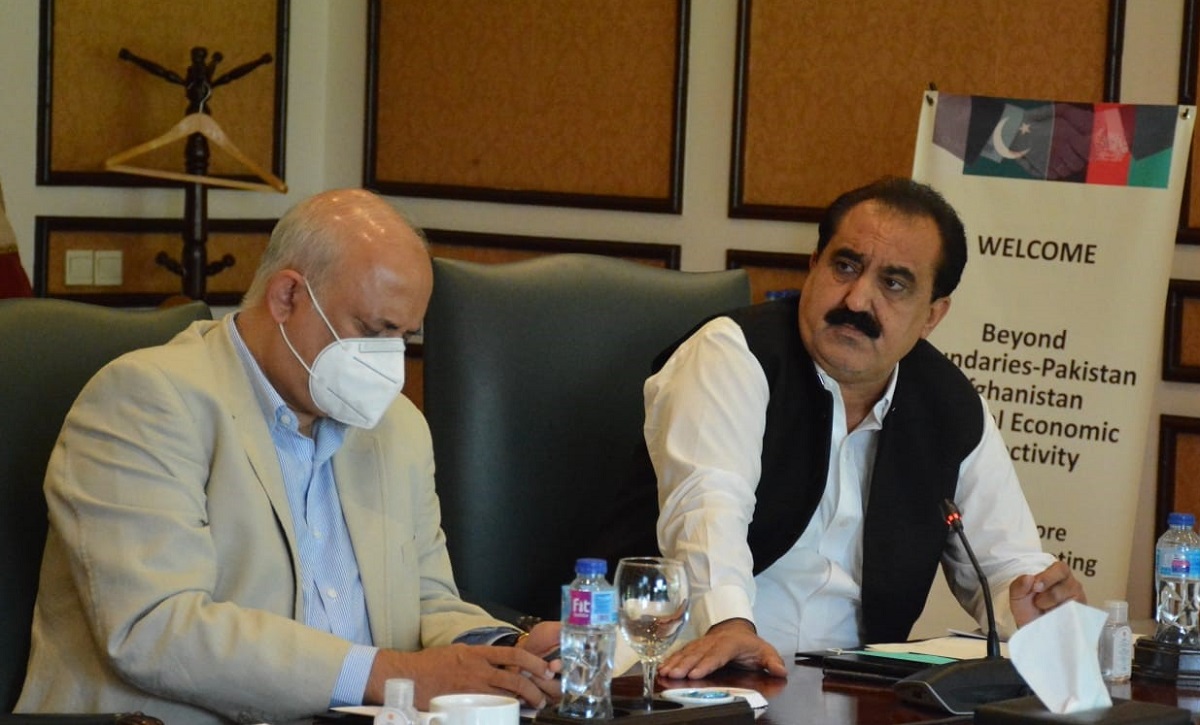Pakistan Core Committee (PCC) members strategic sideline meeting, August 03, 2021, Islamabad
Background
The Center for Research and Security Studies (CRSS), in partnership with its Afghan counterpart, Organization for Economic Studies and Peace (OESP), has been implementing a Pakistan-Afghanistan Track 1.5/ II initiative titled: “Beyond Boundaries – Pakistan Afghanistan Regional Economic Connectivity (BB-PAREC)” since October 2015. The new phase of this project commenced in June 2021.
PCC Strategic Sideline Meeting
In order to discuss the ongoing challenges vis-à-vis regional economic connectivity and to pen down exigent issues hindering the bilateral economic relations for discussion with Afghan counterparts in the upcoming BB-PAREC dialogue, CRSS convened a strategic sideline meeting (SSM) of the PCC members on August 03, 2021, at Serena Hotel, Islamabad. The agenda of the meeting included:
- review of the activities and achievements under the BB-PAREC project and the way forward,
- discussions regarding the recent initiatives by the National Assembly (NA) and the Pak-Afghan Friendship Group (PAFG) for strengthening the bilateral relations and,
- extracting key points of discussion for the upcoming BB-PAREC bilateral dialogue.

Participants included Members National Assembly, Shandana Gulzar, Yaqoob Shaikh, and Gul Dad Khan; Former Defense Secretary Lt. Gen. (retd) Asif Yasin Malik; Former Minister of State and former Chairman BOI Haroon Sharif; Senior Anchorperson, Express News, Rehman Azhar; Advisor to the Speaker National Assembly, Barrister Sahar Sulaiman; Anchors for PTV, Muhammad Shoaib and Zaryab Rajput; Executive Member KP Chamber of Commerce and Industries Anila Khalid (virtually), and Secretary General PAJCCI, Faiza Zubair. CRSS was represented by Executive Director Imtiaz Gul; Advisor Programs, Sameena Imtiaz; Director Programs, Zeeshan Salahuddin; Program Manager, Junaid Khan, and Program Coordinator, Laraib Nisar. Dr. Camilla Macdonald also represented the FCDO at the moot.
Welcome and Agenda Setting
Welcoming the members, Executive Director Imtiaz Gul presented an overview of the activities held under the Beyond Boundaries project during the last five years. He highlighted the current volatile situation in Afghanistan and emphasized upon the need of Track 1.5/II initiatives during such a vital period. Moreover, he expressed his gratitude to all members of the PCC for supporting the project by actively participating in all Track 1.5/II initiatives and disseminating the recommendations to wider audience and influential policymakers.
Director Program, Zeeshan Salahuddin stated that CRSS’ efforts and initiatives were duly acknowledged by both Pakistan and Afghanistan governments as the recommendations emanated from the project activities have aided both governments enormously in devising bilateral policies and legislations. He was optimistic that CRSS along with these interlocutors will continue to engage in harmonizing the Pak- Afghan relations in the coming years as well.

Speaker Comments
MNA Shandana Gulzar Khan made the inaugural remarks at the meeting stating that the Government of Pakistan (GOP) prioritizes stability and peace in Afghanistan because whatever happens in Afghanistan has direct implications on Pakistan especially Khyber Pukhtunkhwa (KP) and Baluchistan, therefore stability in these provinces cannot be achieved without peace in Afghanistan. She also highlighted that sealing borders does not ensure peace, Pakistan is resolute to continue trade, business, and health exchanges with Afghanistan in the coming years.
While shedding light upon the aims and objectives of the PAFG, Shandana Gulzar stated that PAFG’s agenda is completely pro-Pakistan, which currently focuses on improving economic connectivity between Afghanistan and Pakistan through collaborative efforts in the trade sector and initiatives such as shared border markets, to create opportunities for both countries.

Presenting export statistics, she stated that since 2014, fresh meat was the only commodity whose export was boosted. Therefore, Pakistan’s main focus should be on endeavors which yield quick results e.g., the livestock industry, even if Pakistan has to start these initiatives on its own like we did in visa relaxation regime, medical and scholarship visas, and several other confidence building measures. This will further build confidence and erase mistrust, hence paving way for future cooperation and collaborations. She also stated that the priority should be those endeavors that Afghanistan will not refuse under any circumstances.
Commending the achievements of BB-PAREC, Gen. Asif Yaseen Malik remarked that this group has achieved a lot in the last few years, and the process should not seize after the transition of power in Afghanistan. The pre-existing achievements should be used as a steppingstone for future endeavors.
While expressing his concern that the Taliban might come in power in the future in Afghanistan, he proposed to identify and locate stakeholders and parliamentarians in Afghanistan who have a neutral outlook towards Taliban and are interested in becoming a part of a neutral environment and promoting regional economic connectivity.
Building upon the points, MNA Yaqoob Shaikh stated that the major achievements of the PAFG include increasing the ease of doing business and lowering the cost of business. Currently, one of the greatest hindrances in Afghan transit trade is the disputed control of borders, which hinders the bilateral trade as much as it impacts Pakistan’s trade with Tajikistan and Central Asian Republics (CARs). Mr. Imtiaz Gul raised a concern about this problem resulting in a drop in trade to CARs, to which MNA Shaikh responded that a drop is observed in Pak-Afghan trade but Pakistan’s trade with CARs remains yet unhindered.
While highlighting the significance of CRSS’ initiative, Haroon Sharif, the group’s principle economist, said that engagement and discussion on the critical issues related to economy must not stop. Commenting upon the future of Afghanistan he stated that no matter what the situation in Afghanistan turns out to be, a certain level of economic activity (both formal and informal) will continue in the region. He further added that Pakistan can turn Afghanistan’s current challenges to opportunities by making efforts at the macro level and initiate regional talks and trade groups with China or Saudi Arabia as an integral member for financial backing. He also stated that economic prosperity brings security, therefore, both countries should focus on improving economic relations. Most crucially, he suggested that we should have targeted small investments in Afghanistan to boost trade and build confidence.

MNA Gul Dad Khan briefed the participants that Prime Minister Imran Khan has stated time and again that Pakistan will refrain from involving in Afghanistan’s internal matters. However, Pakistan will continue to have enhanced trade and economic relations with Afghanistan. He also stated that Pakistan, Iran, and China can play a critical role in sorting the crucial intra-Afghan issues. Because a new stable and prosperous Afghanistan can rise through intra-Afghan unity.
Briefing the participants regarding the crucial role of media in these testing times, senior anchor-person Rehman Azhar suggested that alongside discussion on trade and economic connectivity, we should also focus on security and media related dialogues. He also recommended that both governments should build a mechanism of joint collaboration between media houses as currently the media houses face extreme consequences whilst promoting positivity. Seconding Rehman’s point, anchorperson Muhammad Shoaib also suggested that media should work on stories and news that promote people-to-people interactions. He also stated that both countries should engage in bilateral tourism activities to strengthen the bilateral relations.
In her concluding remarks, MNA Shandana Gulzar proposed a joint meeting of the members of PAFG with the core committee of BB-PAREC in order to apprise the members with the 47 initiatives taken by the PAFG. She suggested that Pakistan Afghanistan Joint Chamber of Commerce and Industries (PAJCCI) should also have their meaningful presence in Peshawar, Quetta, and Islamabad along with their head office in Karachi.
Main Suggestions:
- The previous achievements of BB-PAREC should be used as a stepping stone for the future
- Focus on low-hanging fruits, quick endeavors, and initiatives that Afghanistan will never oppose
- Engagement and discussion on the critical issues related to economy must not stop; we should extract commitment from key stakeholders on both sides to keep working for continuation and improvement of economic relations
- Identify and locate stakeholders and parliamentarians in Afghanistan who have a neutral outlook towards Taliban and are interested in becoming a part of the neutral environment to promote regional economic connectivity
- We should find ways and means such as Asian Development Bank and tap into potential liquidity available in the region for small investments in livelihood projects in Afghanistan to boost trade, employment, and productivity
- Efforts must continue for media engagement and collaboration to promote themes of peace and economic development
- PAJCCI presence should be extended also to Peshawar, Quetta, and Islamabad
- BB-PAREC members should get a briefing on the 47 initiatives by the PAFG which can provide some milestones for our future dialogues as well as action such as investments in public-focused projects
